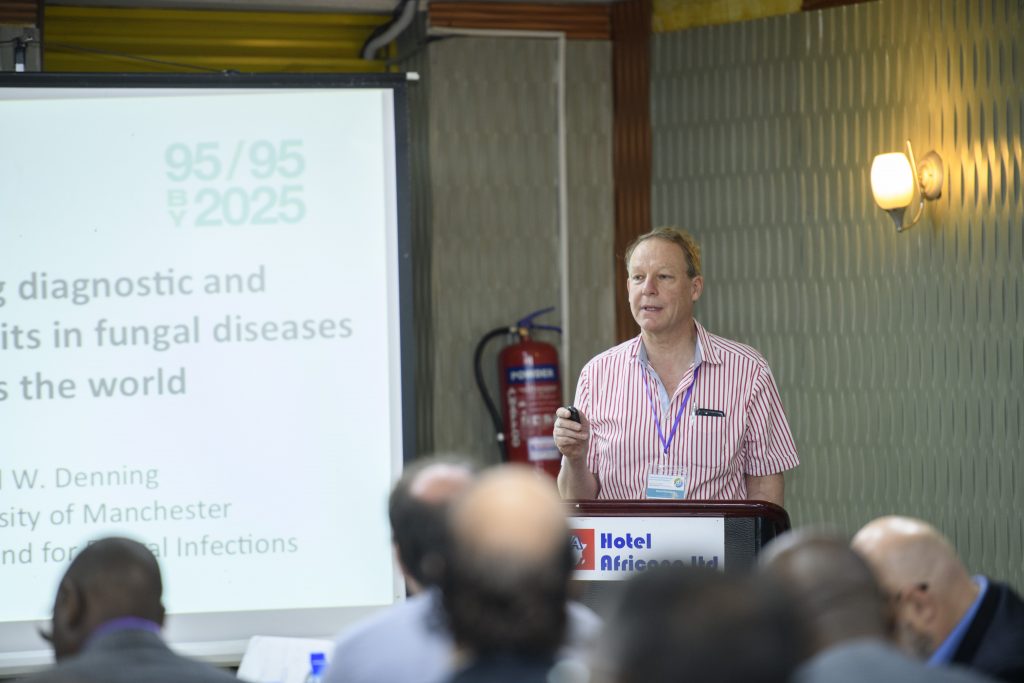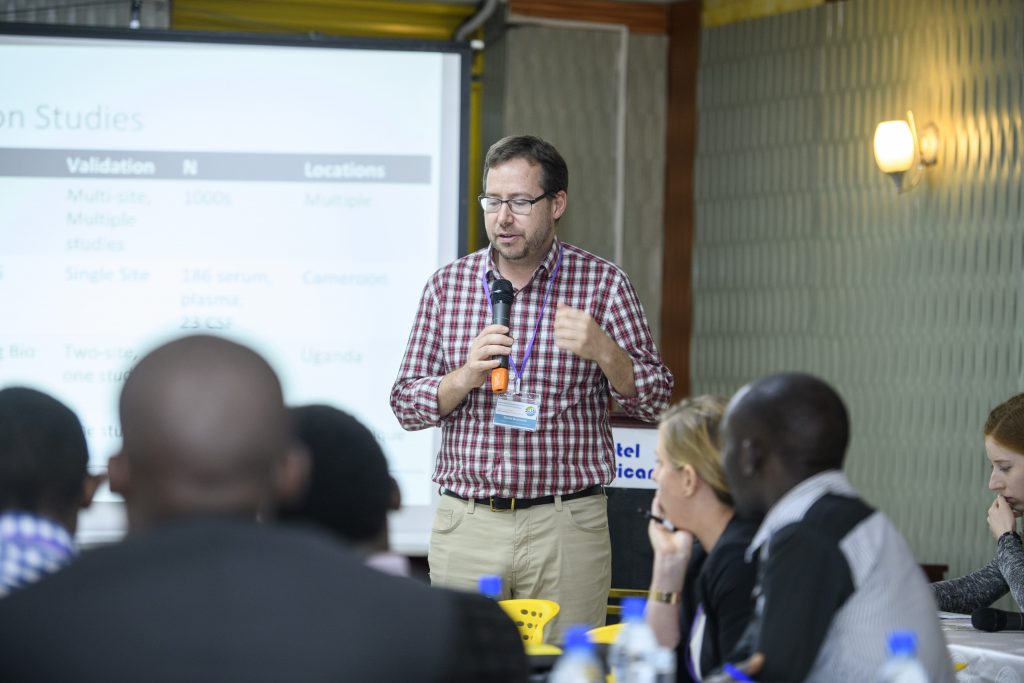Global Fungal Infection Forum 3 in Kampala
In association with the Global Advanced HIV Disease Consortium (ADC), GAFFI convened the third Global Fungal Infection Forum in Kampala, Uganda between 10th and 12th April 2018.
The objective of the meeting was to gather experts and review evidence on available in vitro diagnostics for HIV/AIDS-associated opportunistic infections and serious fungal diseases for inclusion in the World Health Organisation List of Essential In Vitro Diagnostics (WHO EDL).
The meeting was timed to precede and help inform the WHO’s Strategic Advisory Group of Experts on In Vitro Diagnostic (SAGE-IVD) meeting. An initial selection was made to focus on key non-culture diagnostics, i.e. TB urinary antigen (LAM), cryptococcal antigen, Histoplasma antigen, Aspergillus IgG, Pneumocystis PCR and Toxoplasma IgG/IgM and one on antifungal therapeutic monitoring. Summary arguments were also presented for culture based diagnostics and direct microscopy. In addition, twelve keynote talks on advanced HIV disease, difficult clinical cases with diagnostic considerations in advanced HIV, importance of measuring CD4, laboratory systems strengthening, antimicrobial empiricism, and quality assurance systems for the selected diagnostic tests.

Ninety-five experts in HIV, Microbiology, Mycology, Parasitology, Public Health and laboratory sciences were invited from LMICs, global organisations, research institutes, academic institutions and diagnostic and antifungal marketing companies globally to develop consensus on which tests should be deemed ‘Essential’, with a primary focus on LMICs, and non-culture based tests. Key considerations were test performance, simplicity of use and clinical impact.
Consensus recommendations by the experts on the essentiality of the different diagnostic tests were as summarised below:
| Category | Diagnostic Assay | Recommendation | Setting |
|
Non-culture based diagnostics |
Cryptococcal antigen lateral flow assay | Very strong* | LMICs, AIDS-related cryptococcal meningitis |
| Tuberculosis lipoarabinomannan antigen | Very strong* | LMICs | |
| Histoplasma antigen | Very strong | Ares of high incidence/prevalence, disseminated histoplasmosis in AIDS, otherwise as reference test | |
| Cryptococcal antigen quantification/titres | Strong | LMICs | |
| Aspergillus IgG | Strong | TB services in LMICs | |
| Toxoplasma IgG | Strong | MICs with high toxoplasma prevalence | |
| Moderate | LICs | ||
| Pneumocystis pneumonia PCR | Strong | MICs and reference laboratories in LICs | |
| 1,3 Beta-D-Glucan | None | – | |
| Galactomannan | None/strong | In limited circumstances in MICs only | |
| Antifungal drug monitoring | Strong | MICs | |
| None | LICs | ||
| Conventional diagnostics | Direct microscopy/histopathology | Strong* | All laboratories of LMICs |
| Blood culture | Strong* | All laboratories of LMICs | |
| Bacterial culture | Strong* | All laboratories of LMICs | |
| Fungal culture | Strong* | All laboratories of LMICs |
Abbreviations: LMICs: low and middle income countries. MICs: Middle income countries. LICs: Low income countries. ELISA: enzyme linked immunosorbent assays. LFA: Lateral flow assays. PCR: Polymerase chain reaction. *included on the 2018 WHO List of Essential In Vitro Diagnostic.
The first WHO EDL issued in May 2018 included cryptococcal antigen lateral flow assay for screening for and diagnosing cryptococcal disease on whole blood, serum and cerebrospinal fluid and tuberculous antigen (lipoarabinomannan) in urine to diagnose disseminated TB in AIDS in those with C4 counts under 100/µl, along with direct microscopy and histopathology, blood culture and bacterial, mycobacterial and fungal cultures.

The EDL will be expanded and updated annually with the intention to ultimately cover a broad, comprehensive spectrum of disease. Tests that are subject of future applications for inclusion onto the EDL include, Histoplasma antigen in serum or urine to diagnose disseminated histoplasmosis in AIDS in countries where the disease is common, Aspergillus IgG detection to diagnose chronic pulmonary aspergillosis which is often misdiagnosed as TB, Cryptococcal antigen quantification (and as an alternative to a lateral flow assay) to determine the likelihood of meningitis based on antigen amount in serum (titre of >1:160), therapeutic monitoring of itraconazole and voriconazole using bioassay to ensure enough antifungal is present for efficacy and not excess causing toxicity or too low with the risk of acquired resistance, Pneumocystis PCR, and Toxoplasma serology
Adoption by hospitals, states and countries is the next critical step to realize the benefits of inclusion of these tests onto the EDL. In addition to advanced HIV disease, patients with severe lung disease, having cancer treatment, organ transplant recipients and many other patients develop serious fungal infections, so easily available diagnostics will be of universal benefit to humankind.
The Global Forum III was supported by the following organisations and companies to whom GAFFI is most grateful: IMMY, LDBio, DYNAMIKER, OMEGA, TIANJIN ERA BIOLOGY, CIDARA, GILEAD, PFIZER, ECMM, MIRAVISTA, BECKMAN COULTER, BIOMERIEUX, PULMOCIDE, ISHAM, ROCHE, Fungal Infection Trust and the CDC foundation
View the Global Fungal Infection Forum 3 Report
View the Global Fungal Infection Forum 3 References List
View the Global Fungal Infection Forum 3 Participants List